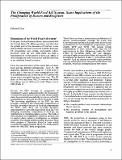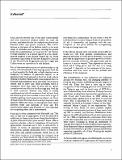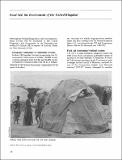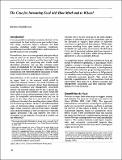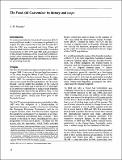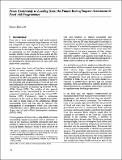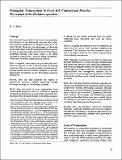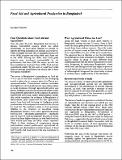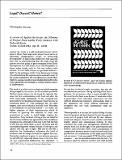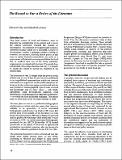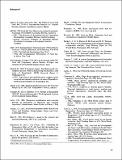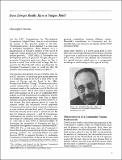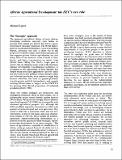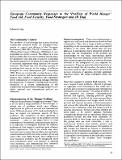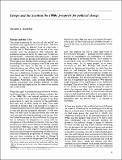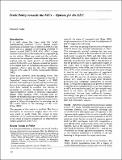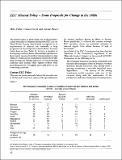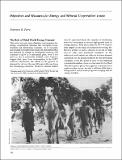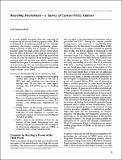1980 - 1989: Recent submissions
Now showing items 141-160 of 430
-
The Changing World Food Aid System: Some Implications of the Proliferation of Donors and Recipients
(Institute of Development Studies, 01/04/1983)SUMMARY SUMMARY The world food aid system has become a very complicated network, evolving from the earlier simplicities of the 1950s and 1960s when it was practically synonymous with the US cereals food aid under PL ... -
Editorial
(Institute of Development Studies, 01/04/1983) -
Food Aid: the Involvement of the United Kingdom
(Institute of Development Studies, 01/04/1983)SUMMARY SUMMARY This brief note outlines the UK's £75mn commitments to the food aid programme (1982/83) in terms of the European Community's Community Actions, Food Aid Convention National Actions and the World Food ... -
The Case for Increasing Food Aid: How Much and to Whom?
(Institute of Development Studies, 01/04/1983)SUMMARY SUMMARY A range of scenarios is presented indicating plausible upper limits on the level of food aid likely to be required by the end of the 1980s. Projections are found to imply large increases in imports of ... -
The Food Aid Convention: its history and scope
(Institute of Development Studies, 01/04/1983)SUMMARY SUMMARY This article gives an historical account of the negotiations and fèatures of the three Food Aid Conventions of 1967, 1971 and 1980, which are milestones in international cooperation on food aid. The ... -
From Understudy to Leading Star: the Future Role of Impact Assessment in Food Aid Programmes
(Institute of Development Studies, 01/04/1983)SUMMARY SUMMARY This paper stresses the difficulty of resolving the many debates on food aid without closer attention to the impact of food aid programmes. It argues, however, that inadequate, casual, ex?post evaluation ... -
Triangular Transactions in Food Aid: Concept and Practice The example of the Zimbabwe operations
(Institute of Development Studies, 01/04/1983)SUMMARY SUMMARY It is World Food Programme policy to enter into ‘triangular’ food aid transactions — the purchase by donors of food commodities from developing exporting countries for use as food aid — whenever feasible. ... -
Food Aid and Agricultural Production in Bangladesh
(Institute of Development Studies, 01/04/1983)SUMMARY SUMMARY The high degree of food aid dependency in Bangladesh has given rise to concern about the efficacy of food aid as a resource transfer, centring particularly on the question of possible disincentive ... -
A Triumph of Hope over Experience: an Assessment of the Recent Evaluation of the EEC Food Aid Programme
(Institute of Development Studies, 01/04/1983)SUMMARY SUMMARY This latest evaluation of EEC food aid is critical of its workings. One of the main objectives, supporting balance of payments, is only a very modest success. Operation Flood excepted, dairy products, ... -
Legal? Decent? Honest?
(Institute of Development Studies, 01/04/1983) -
The Record so Far: a Review of the Literature
(Institute of Development Studies, 01/04/1983) -
References
(Institute of Development Studies, 01/04/1983) -
Does Europe Really Have a Unique Role?
(Institute of Development Studies, 01/07/1983)SUMMARY The EEC Commission claims that a common development policy is good for Europe. But is it good for the Third World? Are there any intrinsic features of the EEC that invest it with the potential to achieve more on ... -
African Agricultural Development: the EEC's new role
(Institute of Development Studies, 01/07/1983)SUMMARY Since 1970, food output per person in sub?Saharan Africa has fallen by 10?25 per cent. By 1979, aid comprised 54 per cent of the region's investment, and 40 per cent of its imports. Yet aid has done little to ... -
European Community Responses to the ‘Problem of World Hunger’: Food Aid, Food Security, Food Strategies and All That
(Institute of Development Studies, 01/07/1983)SUMMARY The problem of ‘world hunger’ as it is conventionally understood in fact involves a number of related problems. A weakness of the North's response is its failure to recognise interrelationships between these ... -
Europe and the South in the 1980s: prospects for political change
(Institute of Development Studies, 01/07/1983)SUMMARY The USA may be withdrawing from active involvement in North?South issues. Europe, too, has dragged its feet in the various North?South fora. Yet the challenge of the South is growing, and is evident in figures on ... -
Trade Policy towards the NICs — Options for the EEC
(Institute of Development Studies, 01/07/1983)SUMMARY From 1976–78 there was an upsurge in protectionism directed substantially at the NICs. This reached a plateau but may now be on the rise again, although arguments about protectionism have shifted somewhat to trade ... -
EEC Mineral Policy — Some Proposals for Change in the 1980s
(Institute of Development Studies, 01/07/1983)SUMMARY The EEC perceives a mutuality of interest between itself and the Third World in the area of minerals. This was the basis for the introduction in the second Lomé Convention of several mineral?related instruments, ... -
Objectives and Measures for Energy and Mineral Cooperation: a note
(Institute of Development Studies, 01/07/1983)SUMMARY The main constraints on Third World energy development are the high price of imported oil, shrinking resources of fuel wood, lack of financial resources and inadequate technical and management capacity. There is ... -
Recycling Mechanisms — a Survey of Current Policy Options
(Institute of Development Studies, 01/07/1983)SUMMARY Recycling by the private banking system contributed to maintaining global activity in the 1970s, but the capacity of the banks to continue this role in the 1980s is in considerable doubt. Various proposals have ...

